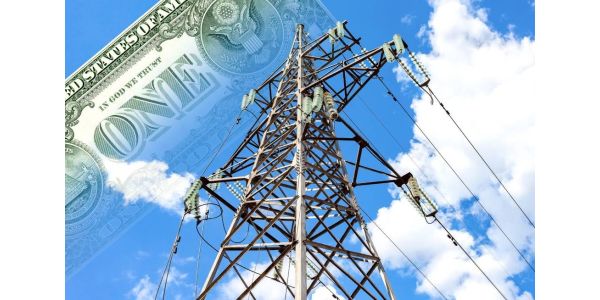EnergyPricing.com / Electricity Rates / New Jersey Electricity Rates
Key Points about NJ Electricity Rates
- New Jersey is a deregulated electricity market meaning you can shop electricity suppliers for a cheaper rate.
- Compare electric rates and providers with EnergyPricing.com by entering your zip code in on online comparison tool.
Current Best Electricity Rates in NJ
Weekly NJ Electricity Rate Trends
Understanding New Jersey's Electric Market
Before we dive into comparing suppliers, let's first understand New Jersey's electric market. Prior to 1999, New Jersey residents could only purchase electricity from their local utility company.
However, New Jersey's energy market was deregulated to allow for consumer choice. This gave customers the option to choose from Certified Retail Electric Suppliers (CRES).
NJ Electric Suppliers Rate Comparison
Finding the best electricity rates in New Jersey doesn't have to be overwhelming. With EnergyPricing.com's easy-to-use interface, comparing rates is a breeze!
Compare New Jersey Electric Rates in just 3 Easy Steps:
-
Click the Get Started Button
This will direct you to all our available electricity providers in your area. -
Compare Rates and Providers
Our easy-to-use interface allows you to compare all the providers and plans effortlessly. -
Enroll Online
Once you find the perfect plan, you can enroll online in less that 2 minutes.
Here's what our customers have to say
Would you like to see how it works in real-time?
Watch the video below to learn how shop online with EnergyPricing.com.


Factors to Consider When Shopping for Third Party Electric Suppliers in NJ
When shopping for energy suppliers in New Jersey, it's essential to consider the following factors:
- Price: Be sure to compare different rates and plans from each supplier to find the best options for your needs and budget.
- Read Customer Reviews: Many customers will post reviews of their experience with each supplier. This can be a great way to get an idea of the customer service and reliability of each company.
- Company Size: Consider the number of customers a company has. It can indicate their size and stability. A larger customer base means more resources to meet customer demands.
- Company History: Researching a company's history can help you gauge its reliability. A company with a long history of reliable service is a positive sign of its longevity.
- Read the Contract: Read the entire agreement carefully before committing yourself to any provider. Look for hidden fees or penalties, cancellation clauses, and contract length.
What is the Best New Jersey Electric Company?
Finding the best electric suppliers in New Jersey can be challenging, but don't worry! The U.S. Energy Information Administration has released a report ranking suppliers based on customer count. According to this report, here are the top 10 electric providers in New Jersey:
- Constellation NewEnergy, Inc. - 45,291 customers
- Energy Harbor Corp. - 41,217 customers
- Inspire Energy Holdings, LLC - 32,282 customers
- Direct Energy Services - 31,738 customers
- SmartEnergy Holdings, LLC - 94,304 customers
- Direct Energy Business - 14,125 customers
- Reliant Energy Northeast LLC - 13,883 customers
- Ambit Energy Holdings, LLC - 41,831 customers
- Verde Energy USA - 10,599 customers
- CleanChoice Energy, Inc. - 25,749 customers
It's important to keep in mind that there are additional options to consider beyond the well-known providers mentioned earlier. Interestingly, some of the most competitive electricity rates in New Jersey can be found with emerging suppliers who are eager to gain market share by offering rates that undercut the established players.
New Jersey Electric Utility Companies
While you have the freedom to choose your electric supplier in New Jersey, your utility company is assigned based on your physical address. These New Jersey electric companies are responsible for maintaining power lines and delivering electricity to your home or business. The 4 major electric utility companies in New Jersey are JCP&L, Atlantic City Electric, PSE&G, and Orange & Rockland. Click the Get Started Button below to compare rates in these utilities today.
What are the Types of Electric Rates in New Jersey
When choosing an electricity provider in New Jersey, you will typically have the option to select from one of these types of plans:
Fixed-Rates Plans - Fixed-rate plans are the most prevalent type of electricity plan in New Jersey. As the name suggests, your rate will be locked in for a set period, usually 12-36 months. This allows you to budget more accurately since your rate won't fluctuate with energy market prices.
Variable-Rate Plans - With a variable-rate plan, your rate will change each month based on market conditions. While these plans may offer lower rates at times, they also come with the risk of higher electricity prices when the market is tight.
100% Green Energy Plans - If you're someone who cares about the environment and doesn't mind paying a little more for electricity, then a 100% Green Energy Plan could be the perfect choice for you. These renewable energy plans offset your energy usage by purchasing Renewable Energy Credits (RECs), which reflect the generation of renewable energy sources like solar or wind. By choosing this type of plan, you can ensure that your energy consumption is supporting renewable energy projects.
Commercial NJ Electric Prices
EnergyPricing.com also offers competitive commercial electric rates in New Jersey. With our large network of suppliers, we can help businesses find the best rates and plans for their unique energy needs. Whether you're a small business owner or a large corporation, we have options to fit your budget and sustainability goals.
Below are some benefits of using EnergyPricing.com for your next commercial electricity contract.
- Direct Access to Providers: Our easy-to-use interfaces let you submit your commercial electricity accounts directly to our network of electricity suppliers. Just sit back and watch the bids come in!
- Expert Advice: Unsure which plan or energy provider to use? No problem. You will have access to an industry expert who can help you.
Tips for Lowering Your Electric Bill in New Jersey
Looking to save even more on your electric bill in New Jersey? Here are a few tips to help you lower your energy consumption and reduce your costs:
Practice Energy Efficiency - Simple changes in your daily routine can make a big difference when it comes to energy consumption. Some ways you can practice energy efficiency include turning off lights and electronics when not in use, using LED light bulbs, and adjusting your thermostat to lower temperatures in the winter and raise them in the summer. You can also consider investing in energy-efficient appliances and equipment.
Consider Renewable Energy - As mentioned earlier, choosing a 100% Green Energy Plan is an excellent way to support renewable energy while lowering your carbon footprint. You can also install solar panels on your property, which will not only reduce your electricity bill but also allow you to sell excess energy back to the grid.
In Conclusion
With all the information and tips provided, you're now equipped to take control of your electricity rates in New Jersey. Don't wait any longer - start comparing rates and enrolling in a new plan today with EnergyPricing.com.
Take advantage of our transparent pricing, expert advice, and our large network of energy suppliers to find the best electricity plan for your home or business. Say goodbye to high electricity bills and hello to savings!
Electricity Shopping Blogs: News, Trends, and Updates
Frequently Asked Questions
Who is EnergyPricing.com?
EnergyPricing.com is an online marketplace that connects residential and commercial customers in deregulated electricity and natural gas states with energy suppliers.
How does EnergyPricing.com make money?
As a registered electricity and natural gas broker with the Public Utility Commission in each state where we operate, energy suppliers pay us a small referral fee for connecting customers like you with them.
How much is electricity per kWh in NJ?
As of May 2025, the average electricity rate in New Jersey is around 19.68 cents per kWh for residential customers, according to the latest EIA data. However, rates can vary depending on your provider, location, and usage. For instance, some sources report averages as low as 16.72 cents per kWh, while others note rates climbing to 20 cents per kWh or higher. Starting June 2025, expect a 17-20% increase, which could potentially push rates to 24.05 cents per kWh. due to recent electricity auctions and rising demand. To find the cheapest electricity rates in New Jersey, use our platform to explore reliable, pre-screened electricity suppliers.
Who is the cheapest electricity provider in NJ?
As of May 2025, Clearview Energy offers the cheapest electricity provider rates in New Jersey with their ClearGuarantee6 plan, starting at $0.1379 per kWh for a 6-month term. However, rates can vary by location, usage, and plan type. Providers like APG&E, Constellation, and Direct Energy also offer competitive rates, often ranging from 10.70 to 12.05 cents per kWh for fixed-rate plans. New Jersey’s deregulated market allows you to compare plans easily. Our platform pre-screens suppliers, provides support, renewal reminders, and a bidding system for businesses to secure the best rates tailored to your needs.
Did electric rates go up in New Jersey?
Yes, electric rates in New Jersey have gone up. As of May 2025, the average residential rate is around 19.68 cents per kWh, according to the U.S. Energy Information Administration (EIA). This is a sizable increase from past years due to inflation and grid upgrades. Starting June 2025, rates are expected to rise further by 17-20% and could potentially reach 24.05 cents per kWh. This is driven by recent electricity auctions like the Basic Generation Service auction, in addition to higher electricity demand. You can find the lowest electricity rates in New Jersey and use our platform to compare pre-screened suppliers in NJ’s deregulated market. We provide support, renewal reminders, and a bidding system for businesses to secure the best rates tailored to your needs.
Why is my electric bill so high in New Jersey?
Your electric bill in New Jersey might be high due to several factors. As of May 2025, the average residential rate is 19.68 cents per kWh, per the EIA, which is above the national average of 16.08 cents per kWh. This rate is set to increase by 17-20% starting June 2025 and could reach 24.05 cents per kWh. This is due to a recent PJM capacity auction where prices surged nine times higher, driven by increased demand and limited supply growth. This auction affects major utilities like PSE&G, Atlantic City Electric, Jersey Central Power & Light, and Rockland Electric, with bill increases of $22-$28 per month for an average for 650 kWh usage. Additionally, New Jersey’s reliance on natural gas for 49% of electricity generation makes rates vulnerable to the volatility of fuel prices. Infrastructure costs for grid maintenance and modernization add to cost as well. High summer usage, especially for air conditioning during heat waves can spike New Jersey electric prices. In June 2024, some residents reported bills as high as $400-$807 during the second hottest June in New Jersey's recorded history. Luckily, you can lower your bill by using our platform to compare pre-screened suppliers in NJ’s deregulated market, where providers like Clearview Energy offer rates as low as 13.59 cents per kWh. We provide support, renewal reminders, and a bidding system for businesses to secure the best rates tailored to your needs.
What is the average electric bill per month in New Jersey?
As of April 2025, the average electric bill per month in New Jersey for residential customers is about $195. This is based on an average usage of 984 kWh at a rate of 19.68 cents per kWh, according to EnergySage. However, this varies by provider, location, and usage. For example, poweroutage.us reports an average of $124.33 at 19.17 cents per kWh, while SolarReviews estimates $135 at 20 cents per kWh. Starting June 2025, expect bills to increase by 17 to 20 percent, adding $22 to $28 monthly, due to recent electricity auctions, potentially raising the average to $160 to $165. To reduce your costs, explore our platform, which compares pre-screened suppliers in NJ’s deregulated market, offering personalized support, timely renewal notifications, and a bidding system for businesses to find the most competitive rates. Simply enter your zip code to discover savings opportunities.










